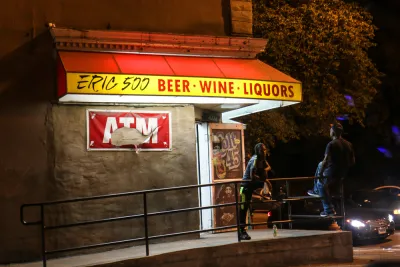A new zoning code in Baltimore will reduce the number of liquor stores in the city in hopes of reducing the violent crime rate. Will there be unintended consequences?

It was at least a decade ago when researchers from Johns Hopkins Bloomberg School of Public Health turned their attention to Baltimore’s effort to revise its decades-old zoning code. Many research papers, meetings, and draft revisions later, the results of the policy change they brought about—a reduction in the number of liquor stores in Baltimore’s residential neighborhoods—will finally take effect on June 5.
Research has shown that there is a definitive link between the number of liquor outlets and a city’s violent crime rate. Will the communities surrounding the closed stores actually experience the desired outcome? That will probably take another few years to determine. Still, the Baltimore story shows how innovative ideas can gradually be translated into real regulations. It also illustrates that even when the desired outcomes occur, members of the community can be negatively affected.
A few store owners have changed their businesses, but many others don’t quite get what’s about to happen to them, says Mario Chang, KAGRO’s president. “There are a lot of mom and pop owners and some of them have been there for 20 years, 30 years. These businesses were their retirement,” says Chang. “They don’t really understand about the closing.” Starting over will be hard for many of them.
FULL STORY: Closing Liquor Stores, Hoping to Gain Public Health

Analysis: Cybertruck Fatality Rate Far Exceeds That of Ford Pinto
The Tesla Cybertruck was recalled seven times last year.

National Parks Layoffs Will Cause Communities to Lose Billions
Thousands of essential park workers were laid off this week, just before the busy spring break season.

Retro-silient?: America’s First “Eco-burb,” The Woodlands Turns 50
A master-planned community north of Houston offers lessons on green infrastructure and resilient design, but falls short of its founder’s lofty affordability and walkability goals.

Test News Post 1
This is a summary

Analysis: Cybertruck Fatality Rate Far Exceeds That of Ford Pinto
The Tesla Cybertruck was recalled seven times last year.

Test News Headline 46
Test for the image on the front page.
Urban Design for Planners 1: Software Tools
This six-course series explores essential urban design concepts using open source software and equips planners with the tools they need to participate fully in the urban design process.
Planning for Universal Design
Learn the tools for implementing Universal Design in planning regulations.
EMC Planning Group, Inc.
Planetizen
Planetizen
Mpact (formerly Rail~Volution)
Great Falls Development Authority, Inc.
HUDs Office of Policy Development and Research
NYU Wagner Graduate School of Public Service




























